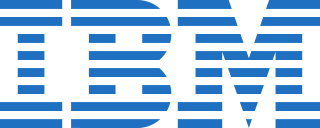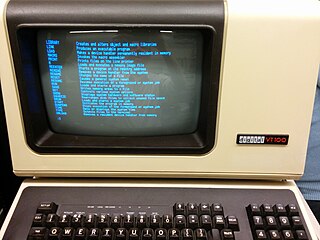OpenEdition can refer to:
- MVS OpenEdition, the original name of UNIX System Services.
- OpenEdition Shell and Utilities Feature for VM/ESA, the original name of z/VM OpenExtensions Shell and Utilities.
- OpenEdition.org, a scholarly Web portal.
OpenEdition can refer to:

AIX is a series of proprietary Unix operating systems developed and sold by IBM for several of its computer platforms. Originally released for the IBM RT PC RISC workstation in 1986, AIX has supported a wide variety of hardware platforms, including the IBM RS/6000 series and later Power and PowerPC-based systems, IBM System i, System/370 mainframes, PS/2 personal computers, and the Apple Network Server. It is currently supported on IBM Power Systems alongside IBM i and Linux.

Multiple Virtual Storage, more commonly called MVS, was the most commonly used operating system on the System/370 and System/390 IBM mainframe computers. IBM developed MVS, along with OS/VS1 and SVS, as a successor to OS/360. It is unrelated to IBM's other mainframe operating system lines, e.g., VSE, VM, TPF.
The Portable Operating System Interface (POSIX) is a family of standards specified by the IEEE Computer Society for maintaining compatibility between operating systems. POSIX defines both the system- and user-level application programming interfaces (API), along with command line shells and utility interfaces, for software compatibility (portability) with variants of Unix and other operating systems. POSIX is also a trademark of the IEEE. POSIX is intended to be used by both application and system developers.
The Single UNIX Specification (SUS) is the collective name of a family of standards for computer operating systems, compliance with which is required to qualify for using the "UNIX" trademark. The core specifications of the SUS are developed and maintained by the Austin Group, which is a joint working group of IEEE, ISO JTC 1 SC22 and The Open Group. If an operating system is submitted to The Open Group for certification, and passes conformance tests, then it is deemed to be compliant with a UNIX standard such as UNIX 98 or UNIX 03.

The mkdir command in the Unix, DOS, DR FlexOS, IBM OS/2, Microsoft Windows, and ReactOS operating systems is used to make a new directory. It is also available in the EFI shell and in the PHP scripting language. In DOS, OS/2, Windows and ReactOS, the command is often abbreviated to md.

VM is a family of IBM virtual machine operating systems used on IBM mainframes System/370, System/390, zSeries, System z and compatible systems, including the Hercules emulator for personal computers.
SableVM was a clean room implementation of Java bytecode interpreter implementing the Java virtual machine (VM) specification, second edition. SableVM was designed to be a robust, extremely portable, efficient, and fully specifications-compliant Java Virtual Machine that would be easy to maintain and to extend. It is now no longer being maintained.
In computing, a hard link is a directory entry that associates a name with a file. Thus, each file must have at least one hard link. Creating additional hard links for a file makes the contents of that file accessible via additional paths. This causes an alias effect: a process can open the file by any one of its paths and change its content. By contrast, a soft link or “shortcut” to a file is not a direct link to the data itself, but rather a reference to a hard link or another soft link.
In computing, echo is a command that outputs the strings that are passed to it as arguments. It is a command available in various operating system shells and typically used in shell scripts and batch files to output status text to the screen or a computer file, or as a source part of a pipeline.
In computing, kill is a command that is used in several popular operating systems to send signals to running processes.
These tables provide a comparison of operating systems, of computer devices, as listing general and technical information for a number of widely used and currently available PC or handheld operating systems. The article "Usage share of operating systems" provides a broader, and more general, comparison of operating systems that includes servers, mainframes and supercomputers.
Windows Services for UNIX (SFU) is a discontinued software package produced by Microsoft which provided a Unix environment on Windows NT and some of its immediate successor operating-systems.

VPS/VM was an operating system that ran on IBM System/370 – IBM 3090 computers at Boston University in general use from 1977 to around 1990, and in limited use until at least 1993. During the 1980s VPS/VM was the main operating system of Boston University and often ran up to 250 users at a time when rival VM/CMS computing systems could only run 120 or so users.
Eclipse OpenJ9 is a high performance, scalable, Java virtual machine (JVM) implementation that is fully compliant with the Java Virtual Machine Specification.
Dalvik is a discontinued process virtual machine (VM) in Android operating system that executes applications written for Android. Dalvik was an integral part of the Android software stack in the Android versions 4.4 "KitKat" and earlier, which were commonly used on mobile devices such as mobile phones and tablet computers, and more in some devices such as smart TVs and wearables. Dalvik is open-source software, originally written by Dan Bornstein, who named it after the fishing village of Dalvík in Eyjafjörður, Iceland.

In computing, help is a command in various command line shells such as COMMAND.COM, cmd.exe, Bash, qshell, 4DOS/4NT, Windows PowerShell, Singularity shell, Python, MATLAB and GNU Octave. It provides online information about available commands and the shell environment.

Unix is a family of multitasking, multiuser computer operating systems that derive from the original AT&T Unix, whose development started in 1969 at the Bell Labs research center by Ken Thompson, Dennis Ritchie, and others.
The Java Development Kit (JDK) is a distribution of Java Technology by Oracle Corporation. It implements the Java Language Specification (JLS) and the Java Virtual Machine Specification (JVMS) and provides the Standard Edition (SE) of the Java Application Programming Interface (API). It is derivative of the community driven OpenJDK which Oracle steward. It provides software for working with Java applications. Examples of included software are the virtual machine, a compiler, performance monitoring tools, a debugger, and other utilities that Oracle considers useful for a Java programmer.
Android Runtime (ART) is an application runtime environment used by the Android operating system. Replacing Dalvik, the process virtual machine originally used by Android, ART performs the translation of the application's bytecode into native instructions that are later executed by the device's runtime environment.